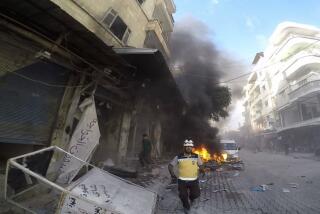Bombings kill 15 Iraqi police cadets
- Share via
BAGHDAD — Bombers targeting Iraqi and U.S. security forces cut a deadly swath across Iraq on Monday, killing as many as 36 people, including at least 15 cadets at a police academy in Baghdad.
Two of the attackers were among the dead.
Also in the capital, an Iraqi army general escaped an assassination attempt, but the roadside bomb targeting him killed one of his bodyguards. The blast was intended for Maj. Gen. Mudher Mawla, who is overseeing the transition of tens of thousands of mainly Sunni Arab paramilitary fighters into the Iraqi security forces and other government entities.
The paramilitaries, known as the Sons of Iraq, are credited with helping reduce violence nationwide. But they are frequent targets of insurgents, who consider them traitors for working alongside U.S. and Iraqi security forces.
The day’s killings pointed up the volatility in Iraq as it heads toward two milestones: provincial elections Jan. 31 and the pullback of U.S. combat troops from cities and towns by June 30. The attacks show the challenges awaiting Iraqi security forces when Americans draw down.
The withdrawal is a condition of the Status of Forces Agreement approved Thursday by Iraq’s parliament, a pact that also calls for all U.S. forces to leave Iraq by Dec. 31, 2011. President-elect Barack Obama said Monday that he hoped they could be out sooner.
“I believe that 16 months is the right time frame,” Obama said as he unveiled his national security team in Chicago, though he added that he would listen to the recommendations of military commanders.
In the Iraqi capital on Monday, twin blasts minutes apart struck the police academy in eastern Baghdad, one of them caused by a car bomb and the other by a young man wearing an explosives belt or vest.
Iraqi police said the blasts killed 16 people, including the suicide bomber, whose head was recovered from the scene. Iraqi officials said the victims were young recruits. Some hospital officials put the death toll at 20, but there was no confirmation of the number from police or U.S. military officials.
There were conflicting accounts as to whether the car bombing or the suicide attack came first. Mohannad Mohammed, a 23-year-old cadet, said he thought the car blew up first as he headed inside the academy’s rear gate.
“I heard a loud explosion. We all rushed toward the scene. It was a car bomb,” said Mohammed, who suffered minor wounds. “I was looking to see if any of my friends were hurt, as there were many dead and wounded bodies on the ground. Soon another bigger explosion took place. I don’t know what happened next. I lost consciousness.”
In the northern city of Mosul, a car bomb targeting a patrol by U.S. and Iraqi security forces blew up shortly before noon. U.S. officials said nine Iraqis, including the bomber, were killed. Four American troops and two Iraqi national policemen were wounded, said a military statement.
Iraqi officials in Mosul put the death toll at 15.
Violence has dropped dramatically across Iraq in the last year, but bombings remain a daily threat.
The Iraqi death toll from bombings and other war-related violence for November was 339, compared with 278 in October, according to figures from the Health and Interior ministries. The number is far lower than November last year, when 608 Iraqis died in war-related violence.
The United Nations’ Iraq envoy, Staffan de Mistura, predicted “spectacular attempts” by insurgents to disrupt the provincial elections and derail security gains made in recent months.
De Mistura made his comments at a news briefing Sunday, a day after a rocket slammed into Baghdad’s fortified Green Zone near the U.N. compound. Two Bangladeshis working for a catering company that serves the United Nations were killed.
--
Special correspondents in Baghdad and Mosul contributed to this report.
More to Read
Sign up for Essential California
The most important California stories and recommendations in your inbox every morning.
You may occasionally receive promotional content from the Los Angeles Times.











